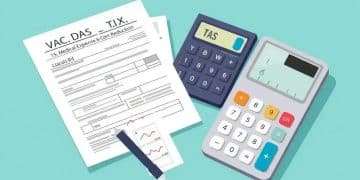Emergency financial assistance programs that can help you

Emergency financial assistance programs provide critical support to individuals facing financial hardships, helping with medical bills, housing costs, and basic needs during urgent situations.
Emergency financial assistance programs can be a lifesaver when unexpected expenses arise. Have you ever wondered how these programs actually work and if you qualify? Let’s dive in and explore how they can provide the support you might need.
Understanding emergency financial assistance programs
Understanding emergency financial assistance programs is essential for anyone facing financial hardships. These programs offer vital help for individuals who need a quick solution to unexpected costs. That could mean paying bills, covering medical expenses, or even finding temporary housing.
Types of Emergency Financial Assistance
There are various types of assistance programs available, each catering to different needs. Government agencies, non-profits, and community organizations often provide these essential services. They aim to alleviate immediate financial stress.
- Government grants for low-income individuals
- Food assistance programs
- Emergency housing funds
- Utility assistance programs
Each program has its specific eligibility criteria. Understanding what you may qualify for can make a significant difference during a crisis. For example, some programs prioritize families with children or the elderly.
How Do These Programs Work?
Applying for emergency financial assistance is generally straightforward. Most programs require an application, which can often be completed online or in person. After submission, the organization reviews your case. They will determine if you meet the requirements based on your financial situation.
While some programs provide immediate aid, others may require proof of income or an emergency situation. It’s important to have necessary documents ready, such as pay stubs or bills, to expedite the process.
Also, be aware that the funding for these programs can be limited. It’s wise to act quickly when a need arises. Support is often available, but resources may run out fast due to high demand.
In understanding emergency financial assistance programs, remember to explore local resources. Many communities have specific initiatives designed to help residents in crisis. Utilizing these resources can offer the support you need during tough times.
Who qualifies for these assistance programs?

Understanding who qualifies for emergency financial assistance programs is crucial for those in need. Each program has its specific eligibility requirements, which can vary widely. Knowing the criteria can help you know if you can apply and receive support.
General Eligibility Criteria
Most assistance programs focus on helping low-income individuals and families. Common factors that determine eligibility include income level, family size, and the nature of your financial emergency. Programs often have income limits, which are based on the federal poverty line.
- Income must typically fall below a certain threshold.
- Households may need to provide proof of their current financial situation.
- Some programs prioritize specific groups, like veterans or the elderly.
- Residency requirements can also affect your eligibility.
Additionally, agencies often look for whether the need is urgent. For example, if you are facing eviction or cannot afford medical care, you may qualify for assistance.
Special Considerations
Different organizations may have unique requirements. Some may require applicants to have a job or be actively seeking employment, while others may focus solely on providing immediate relief regardless of your work status. Checking with local programs can reveal more tailored options.
It’s also essential to remember that some assistance programs can provide help multiple times. If you qualify, you may be able to receive support again in future emergencies, provided you meet the criteria.
How to apply for emergency financial help
Applying for emergency financial help can feel overwhelming, but understanding the process can make it easier. Many programs require similar steps, so familiarizing yourself with the general approach is beneficial. When you find yourself in need, knowing how to navigate the application process can provide you with the assistance you require.
Steps to Apply
The application process usually starts with gathering necessary documents. This may include proof of income, identification, and statements of expenses. Having these ready can speed up your application.
- Check the specific program’s website for application instructions.
- Prepare your identification and proof of income.
- Fill out the application completely, providing accurate information.
- Submit the application as directed, either online or in-person.
After submitting your application, it’s crucial to follow up with the agency. Waiting for a response can be stressful, so reaching out can help you stay informed about your application status. If your application requires additional information, responding quickly will help facilitate the process.
Alternative Application Methods
While many applications are online, some agencies still accept paper applications. Visiting a local office can sometimes provide immediate assistance. Speaking with a representative can also clarify any questions you might have. Local agencies may also offer walk-in services to assist applicants directly.
For those without easy internet access, community centers often have resources to help individuals fill out applications. Utilizing these local resources can help less tech-savvy people navigate the application process.
In summary, applying for emergency financial help typically involves gathering documents, completing an application, and staying in touch with the agency. By understanding the process and utilizing available resources, you increase your chances of receiving the assistance you need.
Real-life success stories of financial assistance

Real-life success stories of financial assistance can inspire hope for many individuals facing financial hardships. These stories showcase how support programs can truly change lives. Hearing about others who have successfully navigated similar struggles can provide encouragement.
Case Study: The Johnson Family
The Johnson family faced a sudden medical emergency that left them with overwhelming bills. They applied for emergency financial assistance through a local non-profit organization. Within a week, they received the support needed to cover medical costs and regain their footing. Their story highlights the importance of timely help in moments of crisis.
Single Parent Success
Another story involves Sarah, a single mother who lost her job during the pandemic. Facing mounting bills, Sarah utilized government assistance programs for food and housing support. With the help she received, Sarah was able to secure a new job and is now thriving. Her experience shows that these programs can provide crucial support during tough times.
Community Impact
Many local organizations also run mentorship programs alongside financial assistance. For example, a community center in Chicago paired individuals with mentors who helped them manage their finances better. This not only offered financial assistance but also educated participants on budgeting and saving. By integrating mentorship, the program saw a 60% success rate in helping individuals maintain financial stability long-term.
These success stories illustrate that while financial assistance is crucial, the support also stems from community involvement and education. Individuals who engage with support programs often find they can turn their situation around and achieve lasting success.
FAQ – Frequently Asked Questions about Emergency Financial Assistance Programs
What types of emergencies qualify for financial assistance?
Emergencies like job loss, medical expenses, and eviction can qualify for financial assistance, providing relief during critical times.
How can I find local financial assistance programs?
You can search online for local non-profits, community centers, and government websites that provide information on available financial assistance programs.
What documentation do I need to apply for assistance?
Typically, you’ll need proof of income, identification, and documentation of your financial emergency, such as bills or eviction notices.
How long does it take to receive assistance after applying?
The response time varies by program, but many agencies aim to provide assistance within a week of receiving your application.






